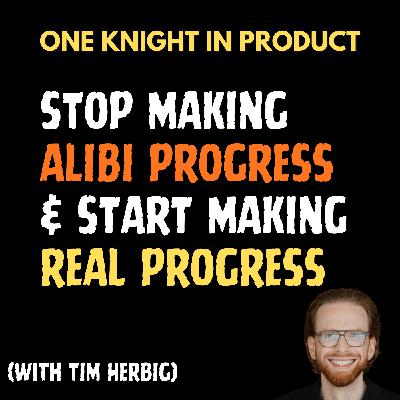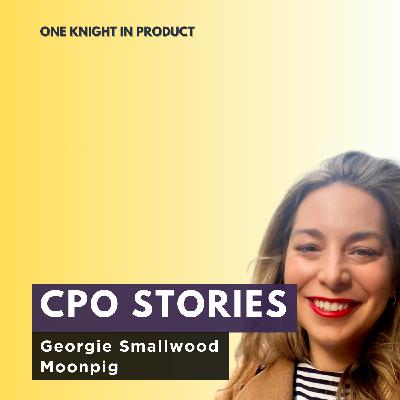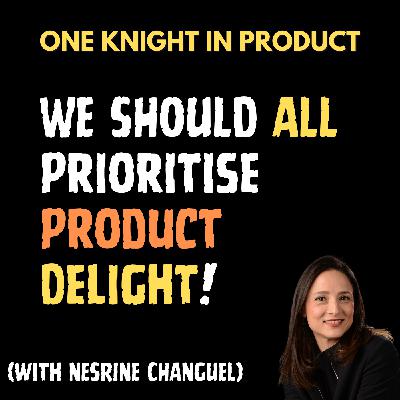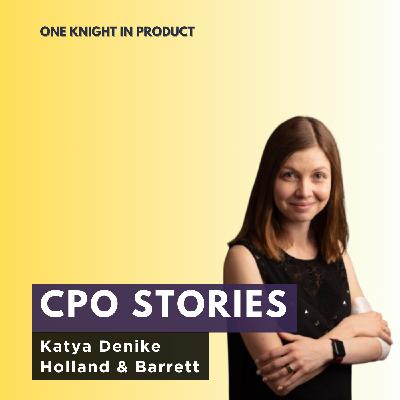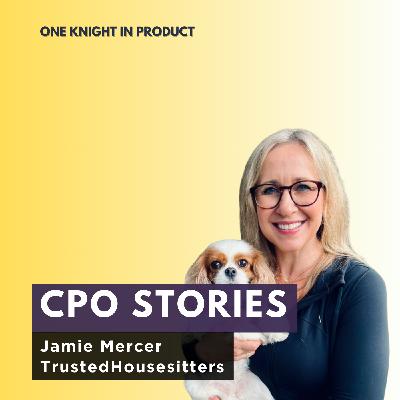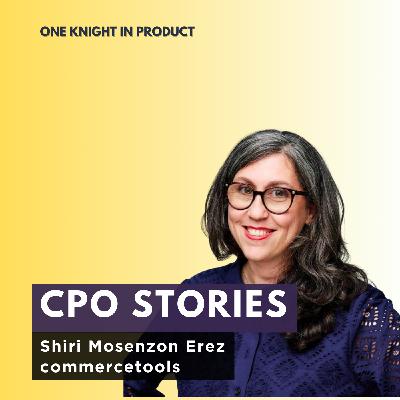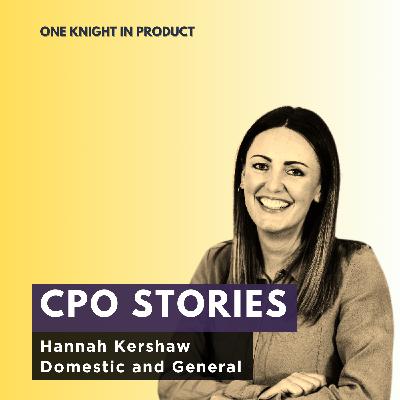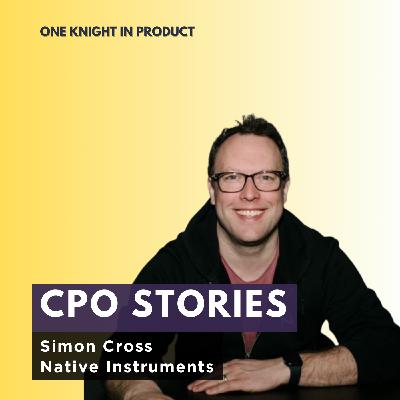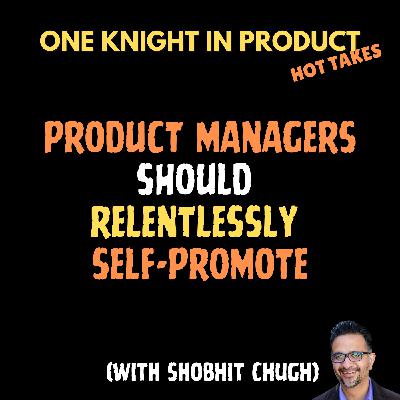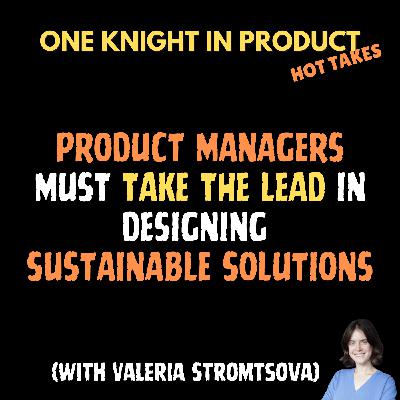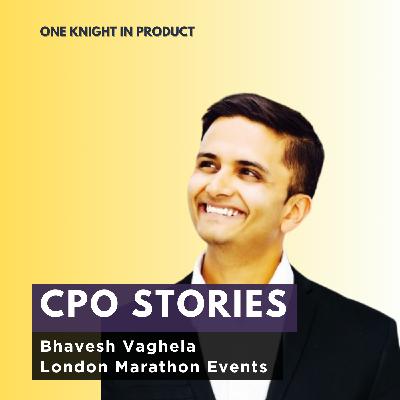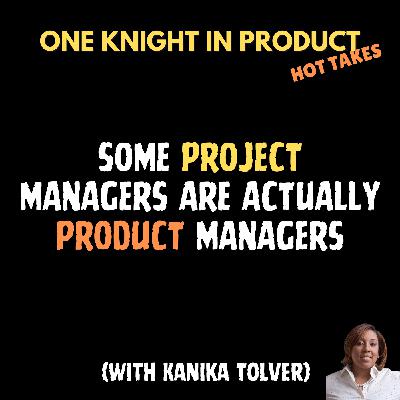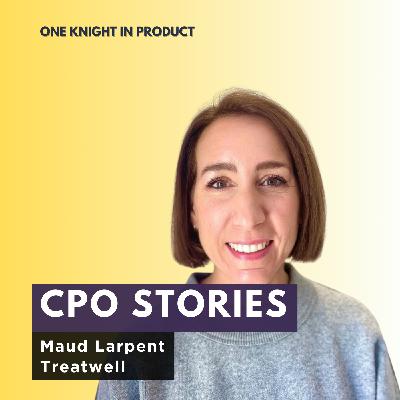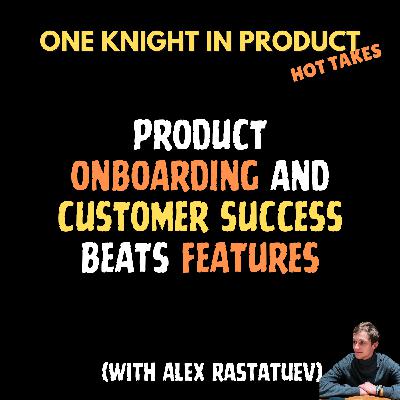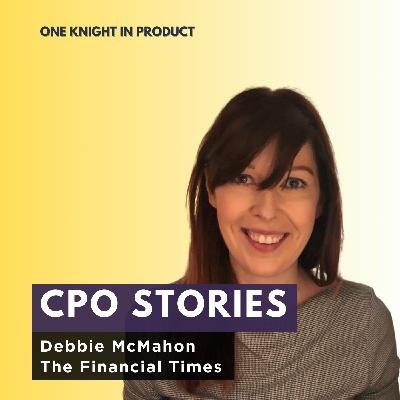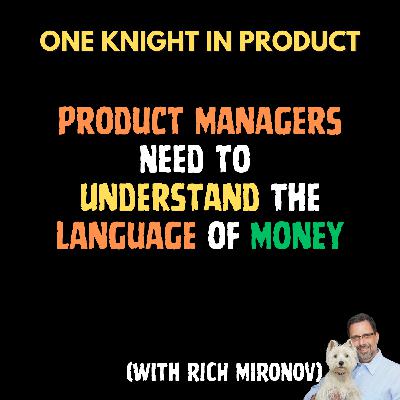Discover One Knight in Product
One Knight in Product

One Knight in Product
Author: One Knight in Product
Subscribed: 135Played: 4,722Subscribe
Share
© Copyright 2020-2025 All rights reserved.
Description
I’m your host, Jason Knight, and One Knight in Product is your chance to go deep into the wonderful world of product management, product marketing, startups, leadership, diversity & inclusion and much more!
My goal with One Knight in Product has always been to bring real chat to the over-idealised world of product management and mix thought leader interviews with day-to-day practitioners from around the world. I want to ask hard, but fair, questions and bring some personality and good, old-fashioned dry British humour to building products.
Subscribe to and share the best product podcast! No others come close 😎
My goal with One Knight in Product has always been to bring real chat to the over-idealised world of product management and mix thought leader interviews with day-to-day practitioners from around the world. I want to ask hard, but fair, questions and bring some personality and good, old-fashioned dry British humour to building products.
Subscribe to and share the best product podcast! No others come close 😎
265 Episodes
Reverse
In this episode, I speak with Jessica Hall. Jess is the Chief Product Officer at Just Eat Takeaway, a global leader in the on-demand delivery space. With a professional pedigree that includes leadership roles at UK retail giants like Tesco, Argos, and Sainsbury's, Jess brings a wealth of experience in navigating complex, high-stakes consumer environments. Our conversation delves into the "big idea" of managing a massive three-sided marketplace, balancing the needs of consumers, partners, and couriers while transitioning from a food-centric brand to an "everything delivered" platform.
We cover a lot, including:
Navigating the Three-Sided Marketplace - Jess describes the Just Eat Takeaway product as a complex ecosystem connecting 60 million active customers with nearly 400,000 partners and a vast network of couriers. The core insight here is that the "product" isn't just an app; it is the seamless orchestration of these three distinct groups, where a failure in one branch inevitably disrupts the value for the others.
Scaling Global Platforms with Local Nuance - Despite operating a global tech platform, Jess emphasises the importance of "optionality" to respect regional differences, from currency formatting to cultural preferences like cash usage. This approach allows the company to maintain a unified technical infrastructure while remaining flexible enough to adapt when a specific market, like the UK or Canada, leads the way in new category demands like grocery delivery.
The Power of Customer Closeness - Moving beyond data and reports, Jess advocates for getting "on the ground" to talk to couriers and visit partner restaurants. By understanding the physical realities, such as a busy kitchen staff finding a feature too cumbersome to use during peak hours, product leaders can solve real-world friction that data trends alone might overlook.
Cultivating Dual-Track Career Paths - Recognising that not every brilliant product mind wants to manage people, Jess champions the value of senior Individual Contributor roles. She highlights that technical and strategic mastery is just as vital as people management, and providing high-level growth opportunities for ICs ensures the organisation retains its most creative and experienced problem solvers.
Leading Through Influence and Commerciality - Jess argues that the best product leaders act as "first-rate business partners" rather than just a bridge between engineering and the business. By focusing on "win-win" outcomes and deeply understanding commercial metrics like order volumes and market trends, product teams earn the credibility needed to influence strategy at the highest levels.
Check out Just Eat Takeaway
Check out Just Eat Takeaway's website: https://justeattakeaway.com, or their careers page: https://careers.justeattakeaway.com.
Connect with Jess
You can connect with Jess on LinkedIn: https://www.linkedin.com/in/jessicalrhall.
In this episode, I'm joined by the returning Michele Hansen, co-founder and CEO of Geocodio and author of Deploy Empathy, now out with a second edition. Michele brings deep experience as a former product manager turned founder, and has spent over a decade helping teams understand customers through rigorous, human-centred research.
We explore what customer research looks like in an AI-accelerated world: where AI genuinely helps, where it falls short, and why talking to real people remains irreplaceable. Along the way, we dig into interviewing craft, curiosity, synthetic users, and some enduring myths that still undermine product discovery.
Episode highlights:
We cover a lot, including:
Why customer interviews still matter in the age of AI - why large language models can accelerate research workflows but cannot replace the insight, judgement, and transformation that comes from engaging directly with customers.
AI as a research intern, not a strategist - AI performs well in certain tasks - transcription, tagging, and basic analysis - but prioritisation, interpretation, and strategy must remain human responsibilities.
The neuroscience of listening and curiosity - both interviewees and interviewers experience genuine pleasure when curiosity is satisfied, reframing interviews as a mutually rewarding process rather than a chore.
What AI misses in real customer conversations - considering the "spiky", unexpected insights that emerge in interviews - and why these often get lost when teams rely too heavily on automated summaries.
Synthetic users, digital twins, and their limits - breaking down different types of simulated users, where they can be useful, and why they depend on high-quality human research to be credible at all.
The problem with the "faster horses" myth - dismantling the misattributed Henry Ford quote and exploring how it's often used to avoid engaging with customers rather than to encourage innovation.
Research as a way to change teams, not just products - how involving teams directly in research builds shared understanding, alignment, and better decision-making across organisations.
Why AI accelerates confusion without product clarity - AI only compounds impact when a clear product vision and customer understanding already exist - otherwise, teams simply move faster in the wrong direction.
Connect with Michele
Learn more about Michele's company, Geocodio: https://www.geocod.io/
Check out the new edition of "Deploy Empathy": https://deployempathy.com/.
Connect with Michele on LinkedIn: https://www.linkedin.com/in/mjwhansen/
Meet Michele at the pub in London! We'll be there on Jan 15th 2026: https://luma.com/xyqi9e2z
On this episode, I speak to Tim Herbig, long-time product management coach, speaker, and author of the new book "Real Progress". Tim has worked with companies like StepStone, Chrono24, Deutsche Telekom and Specsavers, and has spent years helping product managers stop hiding behind frameworks and start making a meaningful impact. His work focuses on helping teams connect product strategy, OKRs and discovery without falling into the trap of rigid process correctness.
Episode highlights:
Alibi Progress vs Real Progress - how teams hide behind "the right way" of doing things, obsessing over methods and templates instead of asking whether any of it actually works
The Progress Wheel - Tim's diagnostic loop that ties strategy, OKRs and discovery together so teams can see where they're actually stuck and what to do next
The three attributes of good product strategy: Decisiveness, Layering and Executability
How to handle OKRs when leadership gives you metrics you can’t influence using zones of control and contribution
How to sell discovery to sceptical stakeholders - by framing it as "protecting the company's investment", not a fluffy UX ritual
Reverse-mapping discovery when you're handed a solution - even if you have to build it, work backwards to define the outcome
Why frameworks should be starting points, not destinations - and why Tim would be disappointed if anyone adopted his wheel dogmatically
... And much more.
Buy the book
You can grab a copy of Real Progress here:
Tim's site: https://herbig.co/real-progress-book/
Amazon UK: https://www.amazon.co.uk/dp/398275190X
Contact Tim
Website: https://herbig.co
LinkedIn: https://www.linkedin.com/in/herbigt/
On this episode, I speak to Sean O'Neill. Sean is the Chief Product & Technology Officer at Syncron, and an executive product leader with a storied career spanning companies like Amazon, Tesco, and GfK. We bond over our shared history at GfK, speak about how Amazon has influenced his product thinking, how it's developed since he moved on, and his approach to portfolio management and right-sizing investments across the product portfolio.
We cover a lot, including:
There's no greater crime than building something the universe doesn't need: Sean's ten key product principles that he lists on LinkedIn - first developed at Tesco - all matter, but building pointless stuff tops his list of product sins.
Use the right tool for the job: Amazon shaped Sean's product DNA, but he's clear that context is king - you can't simply transplant Big Tech practices into legacy environments and expect them to work wholesale.
Most companies under-invest in their strategy: When progress stalls, it's usually because teams are spread too thin across BAU work and one-off feature requests. The best product firms align time and capacity to strategic bets (or admit that they're a professional services company).
Adopt a portfolio mindset: Sean's capital allocation framework helps leaders size and re-balance investments, ensuring resources go where they'll have the biggest impact - and revisiting regularly (but not too regularly) to stay honest.
Learn the language of money: Too many product leaders avoid finance. Sean argues that financial literacy isn't optional if you want credibility with the board and real influence on business outcomes. Learn the numbers!
Connect with Sean
You can connect with Sean on LinkedIn: https://www.linkedin.com/in/seanon/. There you'll find a number of articles, including the one we discuss in this interview: https://www.linkedin.com/pulse/you-dont-need-more-engineers-better-strategic-bets-sean-o-neill-s0vze/
Connect with Sean's "mystery caller"
You can connect with special guest interviewer Sterling O'Neill on LinkedIn: https://www.linkedin.com/in/sterlingoneill/.
On this episode, I speak to Georgie Smallwood. Georgie is Chief Product, Technology & Data Officer at Moonpig - the UK's best-known online gifting and greeting card platform. Georgie has built a global career leading product and technology teams at companies like N26, Xero, and Tier Mobility, before joining Moonpig to help transform a 25-year-old household brand into a modern, tech-driven organisation. In this interview, she talks about what it means to create "moments that matter", how Moonpig balances emotional connection with innovation, and how to lead when you're responsible for product, tech and data all at once.
We cover a lot, including:
Making technology more human: Georgie believes technology should make the world smaller, not bigger - by connecting people, not distancing them. At Moonpig, the goal isn't just to sell cards or gifts, but to help people express love and connection through meaningful gestures.
Product with purpose: Moonpig's mission is to be “the world's greatest gifting companion.” Every card printed represents a moment of love, humour, or memory between people. Georgie sees product management at Moonpig as building moments that matter, not just features.
Balancing connection and innovation: Moonpig has embraced AI and personalisation, but Georgie cautions against rushing ahead for technology's sake. Instead, the team focuses on introducing innovation in a way that feels natural and accessible to mass-market users.
Leading product, technology, and data together: As CPTDO, Georgie bridges three major domains. She admits she's not a data scientist or engineer, but focuses on seeking to understand - asking open questions, learning continuously, and leading through consistency rather than control.
On empowerment and leadership: While she values empowered teams, Georgie is pragmatic about balancing autonomy with business realities. She also believes true innovation needs governance, not chaos.
Check out Moonpig
Check out Moonpig's website: http://moonpig.com/, or their careers page: https://www.moonpig.group/careers/.
Connect with Georgie
You can connect with Georgie on LinkedIn: https://www.linkedin.com/in/georginasmallwood/.
On this episode, I speak to my friend Nesrine Changuel, product coach and author of the new book "Product Delight". Nesrine started her career at Bell Labs as a research engineer before moving into product management at Microsoft, Spotify, and Google, where she even held the title "PM for Delight" on Google Meet. Her work focuses on how products can go beyond functionality to create genuine emotional connections with users.
Episode highlights:
Why Product Delight is more than just a “nice to have”, and isn't just confetti on your boring app
The three pillars of Product Delight: reducing friction, anticipating needs, and exceeding expectations
The difference between surface delight (like balloons on your Apple Watch) and deep delight (features that serve emotional and functional needs together)
Why delight matters just as much in B2B products as in consumer apps, and why everything is B2H
How to get buy-in from leaders and stakeholders by linking emotional connection to revenue, retention, and referrals
The Delight Grid and Nesrine's four-step model for embedding delight into your product process
The risks of chasing the wrong kind of delight (like Deliveroo's failed Mother's Day campaign or Apple's awkward gesture fireworks)
... And much more.
Buy the book
You can grab a copy of Product Delight here:
Nesrine's site: https://nesrine-changuel.com/product-delight-book/
Amazon UK: https://a.co/d/1J7JLZZ
Contact Nesrine
Website: https://www.nesrine-changuel.com
LinkedIn: https://www.linkedin.com/in/nesrinechanguel
Newsletter: https://nesrinechanguel.substack.com
In this episode, I speak with Katya Denike, Chief Product Officer at Holland & Barrett, the 150-year-old health and wellness retailer that has become a household name on the UK high street. Having previously worked at McKinsey, Yandex, Ozon, and Beyond 100, she now leads Holland & Barrett's ambitious digital transformation - helping the company evolve from a traditional retailer into a global wellness ecosystem.
We cover a lot, including:
Transforming a heritage retailer: Holland & Barrett is delivering double-digit growth through a sweeping digital and cultural transformation, investing in everything from supply chain systems to customer-facing apps.
Global vs local: The company builds strong global digital capabilities (like search and e-commerce infrastructure) while tailoring ~20% of the experience for each market to meet regulatory and customer needs.
High street resilience: Despite doom-and-gloom headlines, Holland & Barrett is thriving by focusing on product-market fit, preventative healthcare, and efficient tech-enabled operations.
The app transformation: Taking the mobile app in-house turned it from a struggling third-party product (<5% of digital revenue, 3-star rating) into a core strategic channel (>30% revenue share, 4.5+ rating).
Internal product management is sexy too: Katya insists that logistics, pricing systems, and data management are some of the most rewarding areas for product managers, enabling everything else to work.
Team structure: Around 100 people in product, design, and research, split between "firm foundations" (core systems) and "omnichannel customer experience", plus a small but mighty product ops team.
Leadership leap: Moving into her first CPO role was daunting, but support from her manager pushed her to take the leap and build a truly independent product function inside the company.
Skills for success: Katya highlights high agency, emotional intelligence, and the ability to navigate crucial conversations as must-haves for product leaders.
Check out Holland & Barrett
Check out Holland & Barrett's website: https://www.hollandandbarrett.com/, or their careers page: https://apply.hollandandbarrettjobs.com/jobs/vacancy/find/results/.
Connect with Katya
You can connect with Katya on LinkedIn: https://www.linkedin.com/in/denikekatya/.
You can also check out Katya's podcast, Rocking Cribs & Careers. here! https://open.spotify.com/show/3rheb2Q1YuUvdmeYS8ngqA.
In this episode, I speak with Jamie Mercer, Chief Product Officer at Trusted Housesitters, the global pet care and travel marketplace disrupting two industries at once. Jamie has previously held senior product roles at VoucherCodes, Skyscanner, Student Beans and IVC Evidensia, and now leads product at a scale-up known for putting trust at the heart of its community-driven business.
We cover a lot, including:
TrustedHousesitters' unique proposition - a two-sided marketplace mixing travel and pet sitting, where both pet owners and sitters pay a subscription to help create mutual trust and respect.
Scaling through word of mouth - 70-75% of members join via a friend, and how the team are working to amplify that growth while keeping trust at the centre.
Balancing marketplace dynamics - keeping supply and demand in sync, supporting new sitters with no ratings, and using AI and personalisation to build confidence.
Using AI responsibly - from accelerating customer insight analysis to improving customer support, AI speeds up decision-making but always in service of company strategy.
Building empowered product teams - why Jamie invested early in product ops and product marketing instead of hierarchy, and how she's now preparing to scale with Product Directors.
Commercial product management - the importance of PMs with business acumen who can link solving customer problems with driving commercial outcomes.
Executive alignment as the hardest (and most valuable) job - why alignment across the C-suite is the best air cover a leader can provide for their teams.
Lessons from leadership - why some of the hardest decisions are killing months of work, the surprise of soft skills dominating the CPO role, and why leadership still matters in the AI era.
Check out Trusted Housesitters
Check out Trusted Housesitters' website: https://trustedhousesitters.com/, or their careers page: https://www.trustedhousesitters.com/careers/.
Connect with Jamie
You can connect with Jamie on LinkedIn: https://www.linkedin.com/in/jamiemercer/.
In this episode, I speak with Shiri Mosenzon Erez, Chief Product Officer at commercetools, a global leader in enterprise composable commerce that supports thousands of retailers in hundreds of countries, enabling tens of billions of dollars in revenue annually. Shiri's career journey has taken her from consulting into her first product role at Tesco, through product leadership at Ocado, and now leading at a scale-up with a global enterprise footprint.
We cover a lot, including:
What commercetools does: An API-first, composable commerce engine powering online trade for major global enterprises and manufacturers, enabling flexibility, resilience, and constant uptime for B2C and B2B commerce.
Composable commerce explained: Allowing customers to mix and match best-of-breed components across the commerce value stream or opting for "pre-composed" solutions built on the same composable foundation.
Strategic focus in a flexible platform: How the team decides where to build, buy, or partner, using value stream mapping to prioritise and avoid being pulled in too many directions.
AI and agents in commerce: From data tagging to conversational assistants and dynamic pricing, Shiri shares early enterprise adoption patterns and the role of commercetools' MCP layer in letting customers plug in the agents they trust.
Product team structure: A 55-person product org spanning UX, product management, and close engineering partnerships, with domain-focused teams and a strong CPO–CTO pairing model.
Balancing explore vs exploit: Encouraging teams to pivot to higher-value domains when propositions mature, and celebrating decisions to stop work that’s no longer impactful.
Customer-led vs strategy-led delivery: Using proactive roadmap communication to align big customer requests with company strategy and KPIs, turning reactive asks into collaborative problem-solving.
Technical and business balance in PMs: Moving from a largely technical PM base toward a mix of skills, with growing focus on business value and direct engagement with business stakeholders.
Leadership approach: Shiri's focus on connecting product strategy to company strategy, advocating at the executive level, and ensuring her teams feel purpose, autonomy, and mastery in their work.
Check out commercetools
Check out commercetools's website: https://commercetools.com/, or their careers page: https://commercetools.com/careers/jobs.
Connect with Shiri
You can connect with Shiri on LinkedIn: https://www.linkedin.com/in/shiri-mosenzon/.
In this episode, I speak with Hannah Kershaw, Chief Product Officer at Domestic and General, a company that you might not have heard of but absolutely need in your corner the next time your dishwasher breaks. Hannah's journey took her from marketing to e-commerce, into product leadership at GoCompare, and now to transforming Product at a billion-pound growth organisation.
We cover a lot, including:
What Domestic and General actually does: A century-old, billion-pound business with 6.5 million subscribers across 12 markets, providing repair and replacement services for household appliances through service plans and insurance products.
A behind-the-scenes powerhouse: Domestic and General powers customer journeys via major retail and manufacturer partnerships (e.g. Argos, AO, Hotpoint), often handling registration, support, and repair logistics under their partners' brands.
Product complexity in a partner-led model: Coordinating customer experience, retailer requirements, manufacturer constraints, and service delivery logistics - without directly employing a single repair technician.
Building product from scratch: How Hannah established a product function at Domestic and General, moving from a traditional delivery model to domain-based product teams focused on growth and customer retention.
Evolving team structures: Starting with customer and partner-aligned squads before transitioning to domain-oriented teams, reflecting shifts in strategic focus and incorporating feedback from engineering and delivery teams.
Product vs Proposition: Domestic and General brings together digital product managers and proposition managers - handling platforms and customer experiences on one side, and the commercial performance of insurance offerings on the other.
Philosophy of simplification and belief: Encouraging resilience and optimism, Hannah champions a mindset that anything is possible - helping teams cut through complexity and deliver tangible outcomes.
Pragmatism over product purism: While Domestic and General aspires to be product-led, the focus is on real-world delivery - balancing best practice with the pace and realities of a high-growth, partner-centric business.
Executive-level impact: Demonstrating the value of Product by delivering outcomes. Early wins - such as improving online claims and conversion rates - helped build credibility and demand for product ways of working.
Check out Domestic and General
Check out Domestic and General's website: https://www.domesticandgeneral.com/, or their careers page: https://careers.domesticandgeneral.com/.
Connect with Hannah
You can connect with Hannah on LinkedIn: https://www.linkedin.com/in/hannah-kershaw-421b7b25/.
In this episode, I speak with Simon Cross, Chief Product Officer - now Chief Product & Technology Officer (congrats, Simon!) - at Native Instruments, a company at the heart of global music production. Music lover Simon's journey spans broadcast engineering at Global Radio, product roles at the BBC, product leadership at Meta, and now, shaping the future of audio tools for creators worldwide.
We cover a lot, including:
What Native Instruments actually does: From DJ hardware to post-production tools for Netflix and the BBC, plus powering other companies' products via their platform.
The intersection of creativity and technology: How Native Instruments empowers artists with tactile, high-fidelity tools, and why they're a side-gig for superstar DJs on staff.
AI in music creation: Where it fits, where it doesn't, and the ethical principles Native Instruments uses to ensure artists retain full creative control.
Product in a hybrid model: Balancing perpetual licences and growing subscription models, and how business models shape product release strategies.
Pragmatism over idealism: Why product managers must adapt frameworks to the business "physics" of their company, especially in an era of tighter budgets.
A unique form of product management: Building physical hardware, mission-critical desktop software, and cloud services... all under one roof.
Team structure and specialisms: How PMs, designers, engineers, QA, and unique "sound designers" collaborate to shape sonic outcomes.
Why legacy is both a strength and a constraint: Navigating customer expectations, technical debt, and platform longevity.
Why big-shot product leaders from established big tech companies need to take a pause and not just try to install something that worked before in a company with a very different context.
Check out Native Instruments
Check out Native Instruments' website: https://www.native-instruments.com/, or their careers page: https://www.native-instruments.com/en/careers/.
Connect with Simon
You can connect with Simon on LinkedIn: https://www.linkedin.com/in/sicross/.
Benji Portwin has a CV stuffed with recognisable names, from Spotify to Monzo bank, alongside product leadership roles at accuRx and New Look. These days, he's running an agency dedicated to helping organisations learn how to design and build awesome products.
Benji's hot take? Having been diagnosed with ADHD relatively recently, he's come to regard ADHD as somewhat of a superpower for product managers, and something that enables him and others to be more effective at their jobs rather than being something to be suffered from.
Find Benji on LinkedIn: https://www.linkedin.com/in/benjiportwin.
Or check out People Building Products: https://pbp.team/
Shobhit Chugh is a former Google PM who now helps product managers build their own brand, habits, confidence and career with Intentional Product Manager, and he also runs his own podcast of the same name.
Shobhit's hot take? That too many product managers think that their work will speak for itself but, if they want to get ahead, they should start relentlessly promoting themselves; both inside and outside of the company they work for.
Find Shobhit on LinkedIn: https://www.linkedin.com/in/shobhitchugh/.
Check out Intentional Product Manager: https://www.intentionalproductmanager.com/
Check out my appearance on The Intentional Product Manager podcast: https://www.buzzsprout.com/2399157/episodes/16218073-fractional-product-management-with-jason-knight
Valeria Stromtsova is a Product Manager who traded fintech for sustainability and now works at Treeapp, helping plant trees where they're needed the most.
Valeria's hot take? That product managers need to take the lead in creating a sustainable future, making sure they make a difference by considering the impact of their product decisions on their users, their stakeholders... and the planet we live on.
Find Valeria on LinkedIn: https://www.linkedin.com/in/lerastromtsova/.
Welcome to CPO Stories!
In this new "podcast within a podcast", I'll be speaking to executive product leaders from the UK's biggest companies as well as up-and-coming stars of the future. I'll be digging into how they approach product management within their organisations, how they approached the leap into executive product leadership and trying to get some deep insights into how they view product management practices and culture. If you're a CPO and would like to come on, drop me a line! Or, forward this episode to your CPO and tell them you want them to come on 🙂
About this Episode
In this episode, I speak with Bhavesh Vaghela, Chief Product & Technology Officer at London Marathon Events. Bhavesh started out working as an engineer at HP before a rich career journey through Barclays, TSB, Callsign and Collinson, before moving into the CPTO role at London Marathon Events.
We cover a lot, including:
What London Marathon Events actually does beyond race day, and how it drives physical activity across society
How London Marathon Events approaches Product in a hybrid digital/physical world, and why product goes far beyond apps and websites
Balancing a seamless B2C customer experience with the hard technical demands of world-class live events
What it means for Product and Technology planning when the date can't slip, and getting it wrong could ruin a world record attempt
Balancing the CPO and CTO hats: how combining Product and Technology under one role can drive alignment and delivery in the right type of organisation
Product Management at London Marathon Events: a small team of unflappable, smart people driving high impact with strong purpose
Why domain expertise matters, but curiosity matters more, and what to do when everyone has an opinion about your product
The importance of building a culture of learning through experimentation, humility, air cover and making it ok to fail
Why now is a brilliant time to join London Marathon Events: purpose, opportunity, and the irresistible rise of running
Check out London Marathon Events
Check out London Marathon Events' website: https://www.londonmarathonevents.co.uk/, or their careers page: https://www.londonmarathonevents.co.uk/london-marathon-events/careers.
Connect with Bhavesh
You can connect with Bhavesh on LinkedIn: https://www.linkedin.com/in/bhaveshvaghela/.
Kanika Tolver is a Senior Product Manager by day and the founder of Career Rehab. She's also the author of a book of the same name, "Career Rehab: Rebuild Your Personal Brand and Rethink the Way You Work"
Kanika's hot take? That some project managers out there are actually product managers in disguise. Their responsibilities have changed, their job titles have yet to catch up, and it's up to them to seize the opportunities of the new world of product management.
Find Kanika on LinkedIn: https://www.linkedin.com/in/kanikatolver/ or check out her website: https://kanikatolver.com/.
Welcome to CPO Stories!
In this new "podcast within a podcast", I'll be speaking to executive product leaders from the UK's biggest companies as well as up-and-coming stars of the future. I'll be digging into how they approach product management within their organisations, how they approached the leap into executive product leadership and trying to get some deep insights into how they view product management practices and culture. If you're a CPO and would like to come on, drop me a line! Or, forward this episode to your CPO and tell them you want them to come on 🙂
About the Episode
In this episode, I speak with Maud Larpent, Chief Product Officer at Treatwell, the largest hair and beauty booking platform in Europe which works with 75,000 salons across 15 countries. Maud started out working at Reuters, before moving into product leadership at TripAdvisor and Expedia and onwards to Treatwell.
We cover a lot, including:
All about Treatwell and how it's more than just a booking app
How Treatwell balances B2B and B2C needs, and why the B2B side is central to delivering a great consumer experience
Structuring product at Treatwell: team size, "three-in-a-box" model, and balancing tech ownership with customer problems
How B2C product teams can stay motivated and aligned in a surprisingly sales-led organisation
The importance of being honest about your product maturity when hiring, and hiring people who want to help you get better
Making the transition to leadership: letting go of needing all the answers and learning to lead through others
Balancing strategic and tactical involvement, and making sure you encourage teams to solve problems instead of blindly executing executive ideas
Why Treatwell is a great place for product people: meaningful challenges, international teams, and a mission to support entrepreneurs
Check out Treatwell
Check out Treatwell's website: https://www.treatwell.co.uk/, or their careers page: https://apply.workable.com/treatwell/.
Connect with Maud
You can connect with Maud on LinkedIn: https://www.linkedin.com/in/maud-larpent/.
Alex Rastatuev is a Senior Product Manager for Keyhole, a social media insights company, and is passionate about product-led growth. He's also an active mentor, looking to pay it forward to the next generation of PMs.
Alex's hot take? That thoughtful product onboarding and education is more important than showing all your features all at the same time, and will lead to better activation rates and product growth.
Find Alex on LinkedIn: https://www.linkedin.com/in/alex-rastatuev/ or check out his mentoring profile: https://partnerup.intelligentpeople.co.uk/mentor/alex-rastatuev/.
Welcome to CPO Stories!
In this new "podcast within a podcast", I'll be speaking to executive product leaders from the UK's biggest companies as well as up-and-coming stars of the future. I'll be digging into how they approach product management within their organisations, how they approached the leap into executive product leadership and trying to get some deep insights into how they view product management practices and culture. If you're a CPO and would like to come on, drop me a line! Or, forward this episode to your CPO and tell them you want them to come on 🙂
About the Episode
In this episode, I speak with Debbie McMahon, interim Chief Product Officer at the Financial Times, one of the UK's most well-known and distinctive newspapers. Debbie started out working at the Department for Work & Pensions, moving into a product strategy role there before spending time at the BBC and onwards to the FT.
We cover a lot, including:
All about the FT and its move away from being "just" a newspaper
How the FT structures Product; size, scope, dependency management and whether they have product owners
How to advocate for the value of product management with non-tech leaders and editorial stakeholders
Balancing product management idealism and book principles with the real world of the FT
The importance of being honest upfront about your organisation's context when hiring people
Making the jump to CPO; what was different, what was the same
How CPOs can avoid being seen as ivory tower thinkers or, worse still, "poop and swoopers"
Why product people should work at the FT
Check out the FT
Check out the FT's website: https://www.ft.com, or their careers page: https://aboutus.ft.com/careers.
Connect with Debbie
You can connect with Debbie on LinkedIn: https://www.linkedin.com/in/dmcmahon/.
Returning guest Rich Mironov is a B2B product management legend, long-time blogger and author of "The Art of Product Management". He's recently moved to Portugal to sample the best of European product culture, and is currently actively coaching and mentoring product leaders. His goal is to help them understand what business leaders really care about and ensure that they make an impact by speaking the same language as the rest of the executive suite.
Episode highlights:
1. No one in the leadership team cares about how products are made; they care about making money
We product people can often be so in love with our craft and our terminology that we forget that no one else wants to hear it. We need to craft a narrative that moves beyond esoteric, fuzzy concepts about delight and happiness. These are important, but not as important to the leadership team as how those things make money for the company. We need to get off our high horses and meet our stakeholders where they are, just like we would with our users.
2. Product Managers need to know how their product and their company make money
Too many product managers are not aware of how their company makes money, how things are priced and packaged, and the effect that this will have on the types of decisions they can make. We need to up our game when it comes to financial literacy and understand the growth levers that we can pull if we want to have an impact at the top level.
3. It's important to build internal coalitions to get support early, rather than being the one person who dissents
It's always hard when there's a seemingly blockbuster deal on the table that has big revenue numbers attached, but is going to derail the roadmap for months. It's important to understand the positions of other non-product stakeholders and get their buy-in so that you're not the only person against the deal. Make sure you build bridges with your colleagues and go in with a united front.
4. Learn to tell "Money Stories" to get alignment around your roadmap and calculate the true cost of trade-offs
There are four different types of money stories: Cost savings, Upselling, New Market and Customer Satisfaction. These all use simple heuristics to sense-check the revenue impact of any initiative. Product people can get obsessed with accuracy, but your colleagues are guesstimating all their numbers, so get comfortable with directionally correct numbers. You can still make prioritisation debates clearer by "counting the digits" or comparing orders of magnitude.
5. Organisational context is everything, so you need to understand it
There are big differences between how Private Equity-funded and Venture Capital-funded startups work. They have different timeframes, different goals and, ultimately, a different mindset. There's no right or wrong here, simply an acknowledgement that your company's investment context will dramatically impact the types of decisions the leadership team will make. If you know this context, it can help you make better decisions (as well as decide whether it's the type of company you want to work for)
Check out Rich's essay "Business Cases are Stories about Money"
Rich's original essay, which has led to conference talks as well as this interview, can be found here: https://www.mironov.com/moneystories/
Buy "The Art of Product Management (2nd edition)"
"The Art of Product Management takes us inside the head of a product management thought leader. With color and humor, Rich Mironov gives us a taste of Silicon Valley's tireless pursuit of great technology and its creation of new products. He provides strategic advice to product managers and tech professionals about start-ups, big organizations, how to think like a customer, and what things should cost. He also reminds us to love our products and our teams."
Check it out on Amazon: https://www.amazon.co.uk/Art-Product-Management-Second-Innovator-ebook/dp/B0CVL45F36.
Contact Rich
You can catch up with Rich on LinkedIn: https://www.linkedin.com/in/richmironov/. Or check out his website: https://mironov.com.




